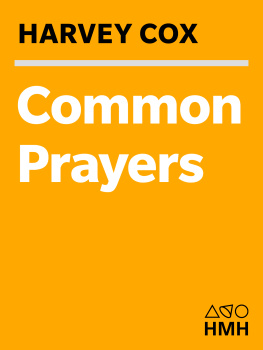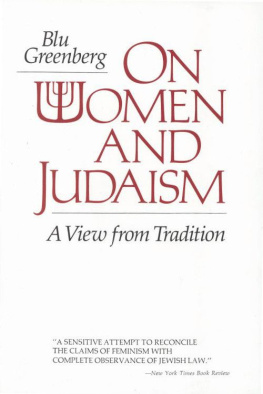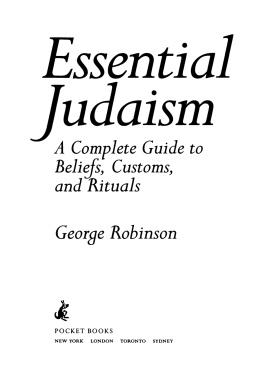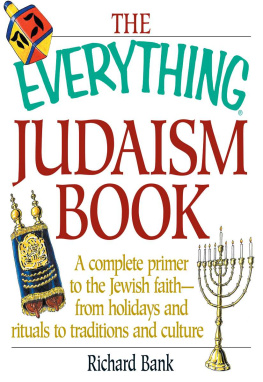


TOUCHSTONE
Simon & Schuster Building
Rockefeller Center
1230 Avenue of the Americas
New York, New York 10020
www.SimonandSchuster.com
Copyright 1988 by Irving Greenberg
All rights reserved
including the right of reproduction
in whole or in part in any form.
First Touchstone Edition 1993
TOUCHSTONE and colophon are registered trademarks
of Simon & Schuster Inc.
Manufactured in the United States of America
15 17 19 20 18 16 14
Library of Congress Cataloging-in-Publication Data is available.
ISBN-13: 978-0-671-87303-5
ISBN-10: 0-671-87303-2
eISBN-13: 978-1-45164-427-2
To Blu
who taught me the meaning of covenantal love
Preface
A T THE PROSPECT OF PUBLICATION of this, my first book, my heart is filled with joy and gratitude. I have been sustained and nurtured by other people and have been shaped by their models, influence, and help. This book, in particular, reflects the ongoing impact of others on me. I would like in this small way to acknowledge my debt of gratitude to them.
This book bears the imprint of two people, above all. One is Rabbi Joseph B. Soloveitchik, the master philosopher/poet of halacha (Jewish law) of our time. Even with the perspective of thirty-five years, it is hard to overstate the electrifying impact on me of the initial encounter with Rabbi Soloveitchiks model and mode of thinking. I was twenty years old, emotionally open and intellectually absorbent, on my maiden flight out of the warm, loving cocoon of the East European refugee yeshiva in which I had studied and been ordained. I had been raised to study and observe all the traditions and rules of halacha; Rabbi Soloveitchik opened my eyes to the patterns of meaning therein. In his analysis the halacha became more than the sum of its thousands of observances and details. It was a system by which to live humanly, a way to seize life whole, a confrontation with the dilemmas and anxieties of existence. The details were the products of divine revelation and an ongoing historic confrontation, love affair, and partnership between God and the Jewish people. Under the light of his illumination, every detaileven those that appeared obscure or mechanicalturned out to be an articulation of a psychological or moral state or an attempt to induce the individual to give deeply human responses to life situations.
If that was not enough of a contribution, Rabbi Soloveitchik went on to show a personal model of open encounter with modern culture and a willingness to influence and be influenced by it. In his Bible and classic text study groups, he brought out the deeply human qualities of those God-intoxicated figures. He showed how to ask questions of the tradition that others didnt dare ask and, thus, to get the sources to yield remarkable answers that otherwise would not have been heard. He combined all this with a deeply spiritual approach to life and a poetic temperament, leavened by humor that always bubbled near the surface, and a winning warmth. I did not study full time with him, but I did have the privilege of hearing his sheurim, of spending individual personal time with him, and of reading his writings over the years. Yet only when I put pen to paper did the full extent of his impact emerge clearly; the manuscript revealed how he had shaped my thinking on Jewish observance, both conceptually and in myriad details. This is not to imply that Rabbi Soloveitchik would agree with all the views expressed in this book; I take full responsibility for this writing. However, I acknowledge with deep gratitude his extraordinary impact on my understanding all these years. My only regret is that he is now too ill for me to be able to express these thanks to him personally.
The other person whose signature is to be found on every page is my father, Rabbi Eliyahu Chayim Greenberg  . More than any other individual, he shaped me, challenged me, taught me. In a sense, my father shaped the primordial structures of my thought at the level before ideas are grasped or put in words. Thus my fathers influence is less overt, less quoted by name but more universally present in this book. His passion for justice and desire to help the underdog, his love for Jews and his demand that they be defended and justified, his conviction that the Jewish people can be trusted and that they are endowed with profound spiritual judgment marked all halachic decisions and guidance that he gave to countless others. His great thirst for learning and his belief that, properly used, Torah must be an instrument of life and love overwhelmed all who studied or lived with him.
. More than any other individual, he shaped me, challenged me, taught me. In a sense, my father shaped the primordial structures of my thought at the level before ideas are grasped or put in words. Thus my fathers influence is less overt, less quoted by name but more universally present in this book. His passion for justice and desire to help the underdog, his love for Jews and his demand that they be defended and justified, his conviction that the Jewish people can be trusted and that they are endowed with profound spiritual judgment marked all halachic decisions and guidance that he gave to countless others. His great thirst for learning and his belief that, properly used, Torah must be an instrument of life and love overwhelmed all who studied or lived with him.
My fathers ardor for stories and storytelling in sacred sources balanced his fervor for halacha in all its details. His wit and ability to see humor in the most solemn texts continue to shape my ways of perceiving everything I read and study. I am sorry that most of the original jokes in this book were removed by the various editors and readers whose judgment I respect, although perhaps this is appropriate since my fathers style of humor, like mine, was more oral than written. I miss him; how I wish I could have given him the nachas of this book in his lifetime.
One reason that I so internalized the Jewish tradition is that I grew up in a nurturing family. My wonderful mother, Sonia Greenberg,  , was the rock of that family. With her quiet strength and unceasing selflessness she labored all her life for her childrens benefit with no thought for herself. Her elemental piety, her continuous conversation with God filled the house with the light of faith. My sisters, Gertrude and Lillian, and my brother, Aharon, were like an extra set of parents in their constant giving to me. I identify the way of life with all that kindness and love.
, was the rock of that family. With her quiet strength and unceasing selflessness she labored all her life for her childrens benefit with no thought for herself. Her elemental piety, her continuous conversation with God filled the house with the light of faith. My sisters, Gertrude and Lillian, and my brother, Aharon, were like an extra set of parents in their constant giving to me. I identify the way of life with all that kindness and love.
I thank Arthur Samuelson, who as editor of Summit Books commissioned this work; Peg Parkinson, who did the first editing; my dear friend David Scheinfeld, who never lost faith in the book and who stepped in to help when I needed it; Dominick Anfuso, the new senior editor at Summit, whose editingdone graciously when he had no obligation to do soimproved many passages. Bambi Marcus typed and retyped with unfailing good spirit and intelligence. Rabbi Shalom Carmy gave me the benefit of a thorough and complete reading and made many constructive suggestions. Rabbi Natan Greenberg critiqued three chapters from the extraordinary spiritual perspective of a Bratslaver. He left me wishing that I knew more about mysticism or that he would some day write a book incorporating the mystical interpretations of the holidays. Rabbi David Harbater graciously checked many footnotes and citations for me. Deborah Greenberg, in accordance with her usual talents and helpfulness, labored intensively and under deadline of galleys to produce a most thorough index.
The germ of this book started as a pamphlet on the High Holy Days for the congregants at Riverdale Jewish Center. My warm feelings for them, for their love of tradition and their response to my ideas remain unabated. Two good friends influenced my thought over the yearsZev (Willy) Frank of blessed memory and David Hartman. Their model and inspiration continue to resonate in my mind and heart.
Approximately half of this book originally appeared in a different form, in a series of holiday guides authored for CLALThe National Jewish Center for Learning and Leadership. The encounter through CLALs programs with the lay leadership of American Jewry had a profound effect on my life and thinking. The challenge of making the tradition meaningful to them and of incorporating their insights and values into meaningful tradition is always with me. I owe an extraordinary debt of friendship and gratitude to CLALs supporters, founders, and primary leaders.
Next page









 . More than any other individual, he shaped me, challenged me, taught me. In a sense, my father shaped the primordial structures of my thought at the level before ideas are grasped or put in words. Thus my fathers influence is less overt, less quoted by name but more universally present in this book. His passion for justice and desire to help the underdog, his love for Jews and his demand that they be defended and justified, his conviction that the Jewish people can be trusted and that they are endowed with profound spiritual judgment marked all halachic decisions and guidance that he gave to countless others. His great thirst for learning and his belief that, properly used, Torah must be an instrument of life and love overwhelmed all who studied or lived with him.
. More than any other individual, he shaped me, challenged me, taught me. In a sense, my father shaped the primordial structures of my thought at the level before ideas are grasped or put in words. Thus my fathers influence is less overt, less quoted by name but more universally present in this book. His passion for justice and desire to help the underdog, his love for Jews and his demand that they be defended and justified, his conviction that the Jewish people can be trusted and that they are endowed with profound spiritual judgment marked all halachic decisions and guidance that he gave to countless others. His great thirst for learning and his belief that, properly used, Torah must be an instrument of life and love overwhelmed all who studied or lived with him.